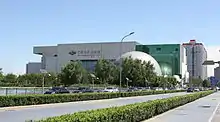China Science and Technology Museum
The China Science and Technology Museum (Chinese: 中国科学技术馆), established in 1988 in Beijing, China, is "the only comprehensive museum of science and technology at national level in China" according to the official website of the Beijing government.[1]
 The China Science and Technology Museum on 14-Aug-2010. | |

| |
| Established | 1988 |
|---|---|
| Location | Beijing, China |
| Coordinates | 40°00′17″N 116°23′32″E |
| Website | http://cstm.cdstm.cn/ywb/ |
Museum history
According to China Internet Information Center, the museum was founded in 1988 and expanded in 2000 at a location on the northern section of Beijing's 3rd Ring Road.[2] Its activities included "popular science exhibitions, Astro-vision film shows, training-based education programs and experiment-based exhibition programs." [3]
In preparation for Beijing's 2008 Summer Olympics, construction of new buildings for the museum began at the Olympic site in 2006. The new museum opened in September, 2009, having been expanded from its previous 40,000 square meters to 48,000 square meters.[2] The previous museum site was closed for several years before undergoing renovation and expansion beginning in 2016.[4]
Museum at Olympic site
The museum at its current site houses both permanent and temporary exhibitions. It has many facilities for science popularization (classrooms, laboratories, lecture halls, etc.) including four special-effect theaters.[5]
Transportation
The museum is located in the Beijing Olympic Village, near the Olympic Green station of the Beijing Subway.[1]
See also
References
- "2018 International Museum Day: China Science and Technology Museum". ebeijing.gov.cn. Retrieved November 12, 2018.
China Science and Technology Museum is the only comprehensive museum of science and technology at national level in China. It is a large scale science popularization facility for the implementation of the national strategy of invigorating the country through science and education and strengthening the comprehensive national power of the country by relying on talented people, as well as for the enhancement of the scientific literacy of the general public.
- "New science museum to open before Olympics". china.org.cn. Retrieved November 12, 2018.
The museum, which boasts the world's largest dome screen video, is expected to officially open to the public in September, 2009. It will become a top-notch public facility for exhibitions, scientific research and other functions. The existing structure that houses the China Science and Technology Museum was built in 1988 and expanded in 2000.
- "China Science and Technology Museum". china.org.cn. January 25, 2008. Retrieved November 12, 2018.
The activities of China Science and Technology Museum include popular science exhibitions, Astro-vision film shows, training-based education programs and experiment-based exhibition programs. The museum covers an area of 40,000 square meters, of which 16,000 square meters is for exhibition halls.
- "New science museum rises, dome and all". China Daily. July 22, 2016. Retrieved November 12, 2018.
The dome theater will be rebuilt based on the original look, but with modern construction materials to replace the rusty old structure. New facilities will be installed to improve electricity and fire safety. The renovation will also unify the style of the whole compound. When completed, the facility will be called the Beijing Science Center.
- "China Science and Technology Museum". Retrieved November 12, 2018.
The Science and Technology Museum consists of not only the five permanent exhibition halls, including 'Science Paradise' located on the first floor in the northwest area, 'Glory of China' on the first floor, 'Exploration and Discovery' on the second floor, 'Sci-tech and Life' on the third floor, and 'Challenge and Future' on the fourth floor, but also a short-term exhibition hall, and four special-effect theaters: Dome Theater, Huge-screen Theater, Motion Theater and 4D Theater. In addition, many laboratories, classrooms, science popularization lecture halls and multifunctional halls are found in the museum.
External links
| Wikimedia Commons has media related to China Science and Technology Museum. |